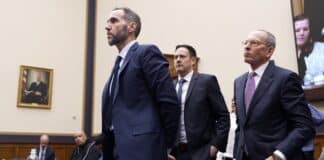The Trump administration issued new guidance on faith in the federal workplace, expanding upon a memo issued earlier in July that offered accommodations for federal employees who have religious needs.
According to the new guidance, sent to agency heads by Office of Personnel Management Director Scott Kupor, “The Federal workforce should be a welcoming place for Federal employees who practice a religious faith. Allowing religious discrimination in the Federal workplace violates the law. It also threatens to adversely impact recruitment and retention of highly-qualified employees of faith.”
Conduct that must not result in “disciplinary or corrective action” includes the display of religious items, such as Bibles, artwork, jewelry, and other materials, religious expressions, and the attempt to “persuade others of the correctness of their own religious views, provided that such efforts are not harassing in nature.”
“Employees may also encourage their coworkers to participate in religious expressions of faith, such as prayer, to the same extent that they would be permitted to encourage coworkers participate in other personal activities,” Kupor explained. “The constitutional rights of supervisors to engage in such conversations should not be distinguished from non-supervisory employees by the nature of their supervisory roles.”
The guidance notes, however, that public employees speaking in an official capacity “are not speaking as citizens for First Amendment purposes, and the Constitution does not insulate their communications from employer discipline.”
Attorney General Pam Bondi launched a task force earlier this year in accordance with President Trump’s executive order combating an anti-Christian bias across federal agencies. Bondi described the task force as one that will “identify any unlawful anti-Christian policies, practices, or conduct across the government; seek input from the faith-based organizations and state governments to end anti-Christian bias; find and fix deficiencies in existing and regulatory practices that might contribute to the anti-Christian bias.”





